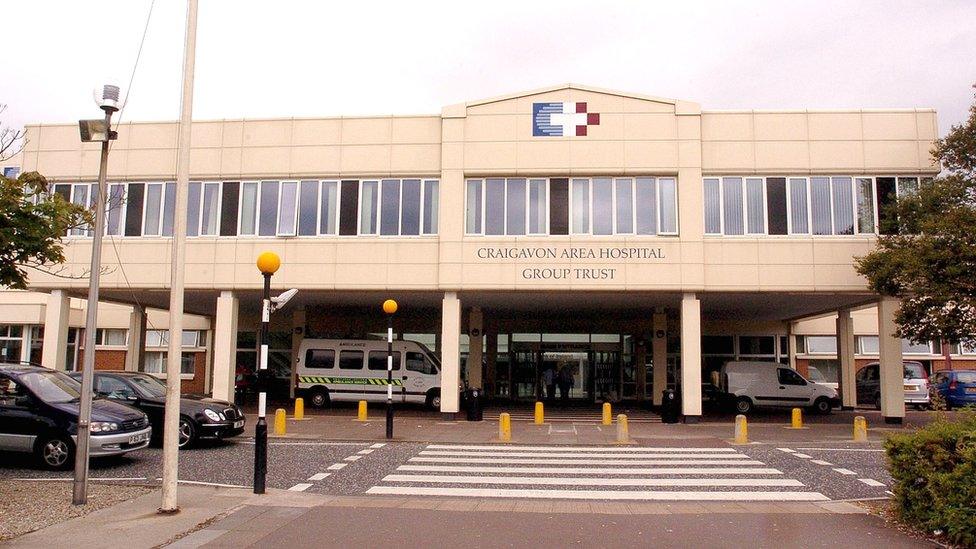Urology inquiry: Hundreds of patients 'received suboptimal care'
- Published

Urology consultant Aidan O'Brien worked at Craigavon Area Hospital before his retirement in July 2020
Almost 600 patients received "suboptimal care", an inquiry into the clinical practice of a urology consultant has been told.
The public inquiry concerns the work of Aidan O'Brien at the Southern Trust between January 2019 and June 2020.
However, it heard his work was part of a separate review started in 2017 before concerns were raised again.
Mr O'Brien previously claimed the trust provided an "unsafe" service and was trying to shift blame on to its medics.
Patients' pain and suffering
Mr O'Brien worked at the Southern Health Trust for about 28 years from 1992 until his retirement in July 2020.
He was temporarily excluded from the workplace in 2017 before returning under supervision.
Opening the inquiry, chairwoman Christine Smith KC acknowledged the pain and suffering experienced by the patients and families affected.
Ms Smith said it was not the purpose of the inquiry to re-examine the care of individual patients - instead its role was to examine the clinical and corporate governance of the Southern Health Trust.
She said she wrote to more than 75 families inviting them to engage with the inquiry.
Ms Smith was highly critical of the standard of material provided by the Department of Health and the Southern Health Trust, which she called "far from satisfactory".
Urology deals with the urinary tract in both men and women, and men's genital organs.
Like other areas of Northern Ireland's healthcare system, it has extensive waiting lists.
When announcing the inquiry in 2020, then-Health Minister Robin Swann said issues around the clinical practice of Mr O'Brien were of the gravest concern.
More than 1,000 patients' records were recalled at the Southern Trust.
Almost 300 were contacted, with dozens of cases given special attention.
'Deficiencies of care'
Lead counsel to the inquiry Martin Wolfe KC said "deficiencies of care had been identified in a number of cases" leading to nine serious adverse incidents (SAIs) being launched.
He said 400,000 pages of evidence had been "scrutinised".
Mr Wolfe said an initial investigation revealed hundreds of patients had received sub-standard care.
He said concerns had been identified in 46 out of 147 patients taken to theatre during the lookback period.
Those concerns were not further explained.
Of the 334 elective in-patient cases reviewed, 120 cases showed a delay in dictation of outcomes ranging from two to 41 weeks, and in the case of a further 36 patients there was no record of care noted on the electronic system.
In one of the elective in-patient cases, the concerns were such that the case had been identified for screening for a SAI review.
It was indicated that a further two cases, involving prostate cancer which were under the management of the consultant, were also being screened for reviews.
This is because there were indications of potential deficiencies in care provided by the consultant, and that these "deficiencies potentially had an impact on patient prognosis".
'Inadequate numbers of clinicians'
Mr O'Brien, who worked at Craigavon Area Hospital, was present to hear the opening statements on Tuesday.
In his witness statement provided to the inquiry before it opened to the public, Mr O'Brien said he had faced a "relentless burden" in his job.
He said that he continued to work while he was on holiday leave and even when he was on sick leave and had frequently voiced his concerns about the inadequacies of the urology service provided by the trust.
Mr O'Brien had claimed the biggest threat to the safety of urology patients was the inadequacies of the service provided by the trust which he contended was inequitable to other specialist services.
He added that he had tried to do the impossible when it was not possible and said any failings on his part should be viewed in this light.
When the inquiry was launched the Southern Health Trust said it would be "fully cooperating with the inquiry process" and shared the "high level of concern" that had been highlighted by the case.
The General Medical Council, the healthcare regulator for medical professionals, is also involved.
Related topics
- Published24 November 2020

- Published21 June 2022

- Published31 August 2021
